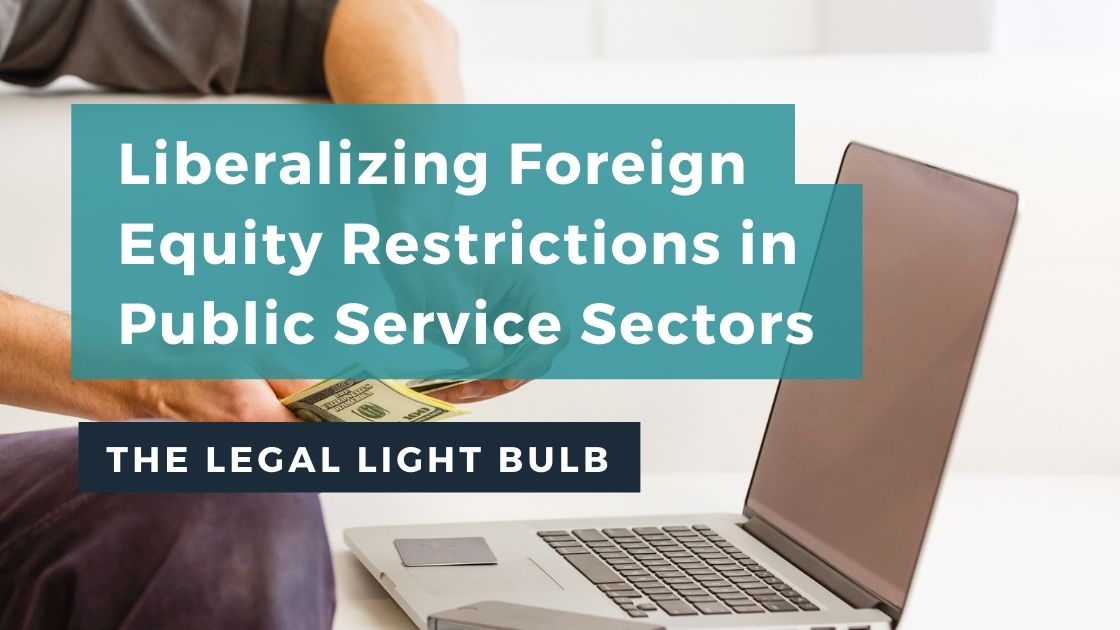In keeping with the Filipino First Policy, the 1987 Philippine Constitution expressly states that operations of public utilities shall be granted only to Filipino citizens or entities organized under the Philippine laws and at least sixty percent (60%) of whose capital is owned by Filipinos.[1] The only issue is that neither the 1987 Constitution nor any law explained what lies under the term “public utilities”.
Commonwealth Act No. 146 or more commonly known as the Public Service Act used and described the term “public service” and not “public utilities”. Therefore, since its effectivity in 1936, all types of public services enumerated under the Public Service Act were required to comply with the Filipino First Policy.
PUBLIC SERVICE ACT AMENDMENT
Now, Republic Act No. 11659, or the Act Amending Commonwealth Act No. 146 otherwise known as the Public Service Act, uses the term ‘public utilities’ and exclusively lists the sectors to which the 60-40 percent foreign equity restriction on public utilities applies, to wit:
- Distribution of Electricity;
- Transmission of Electricity;
- Petroleum and Petroleum Products Pipeline Transmission Systems,
- Water Pipeline Distribution Systems and Wastewater Pipeline Systems, including sewerage pipeline systems,
- Seaports, and
- Public Utility Vehicles.[2]
Thus, any public service not included on the list can now be one hundred percent (100%) foreign-owned.
For a more thorough discussion and advise, it is highly recommended to engage the services of the best corporate law firm in the Philippines.
2023 IMPLEMENTING RULES AND REGULATIONS
After extensive review and consultation with the public, legislators, administrative agencies and other key stakeholders, the National Economic Development Authority (“NEDA”) finally released the Implementing Rules and Regulations (“IRR”) for R.A. No. 11659. The IRR took effect on April 4, 2023.
The IRR clearly states that foreign equity restriction applies to public utilities only. It also provides several safeguards to protect our country’s interest and national security. These include:
- The power of the President to suspend or prohibit any investments in a public service in the interest of national security upon the review, evaluation, and recommendation of the relevant government agency;
- The provision on restriction on investments by foreign state-owned enterprises which prevents foreign state-owned enterprises from owning capital stock in a public utility or critical infrastructure;
- The provision on information security that ensures entities engaged in the telecommunications business to meet relevant ISO standards;
- The reciprocity clause to prevent foreign nationals from owning more than 50% of capital in critical infrastructure unless the country of such foreign nationals accords reciprocity to Philippine nationals; and
- The performance audit provision which mandates the conduct of an independent evaluation to monitor a firm’s cost and quality of services to the public.[3]
According to NEDA Secretary Arsenio Balisacan, relevant administrative agencies may issue guidelines and circulars for the effective implementation of R.A. No. 11659 and its IRR as long as they remain consistent with Commonwealth Act No. 146 as amended, R.A. No. 11659, and its IRR.[4]
With the recent developments in the scope of the Public Service Act as amended and its IRR, it is always a wise step for foreign investors to schedule an online lawyer consultation with the best corporate law firm in the Philippines.
EFFECT TOWARDS THE PHILIPPINE ECONOMY
NEDA is optimistic that the liberalization of the foreign equity requirement would result to increased investments. By removing the long-standing foreign equity limitation on public services, foreign investors will have additional options to engage in the different public service sectors that are not classed as public utilities under R.A. No. 11659 and its IRR.
Additionally, this opportunity also serves as an advantage to businesses that rely on these liberalized sectors since increase in investments in these industries is likely to result in more competition and reduced pricing.
It is imperative to engage top lawyers in the Philippines for an in-depth discussion of the amended legislation and its IRR to better guide future investors who wish to explore the public service sector in the Philippines.
Written by: Atty. Emmarie A. Sese
[1] Article XII, Section 11, 1987 Constitution.
[2] Section 4, R.A. No. 11659
[3] https://ppp.gov.ph/in_the_news/amended-public-service-acts-rules-finally-issued/
[4] https://neda.gov.ph/neda-releases-public-service-act-irr/





